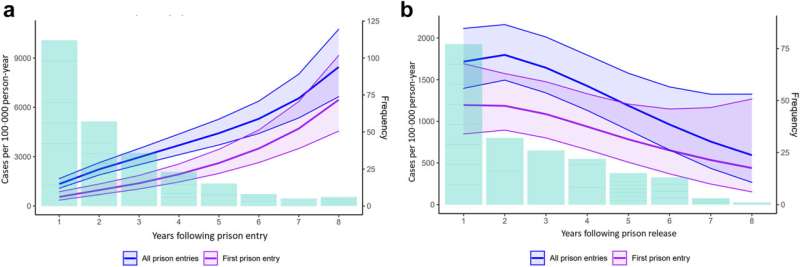This article has been reviewed according to Science X's editorial process and policies. Editors have highlighted the following attributes while ensuring the content's credibility:
fact-checked
trusted source
proofread
People deprived of liberty are at very high risk of tuberculosis, even years after release, finds study

Incarcerated people are at an alarmingly high risk of tuberculosis (TB) and this risk persists for years after their release, according to a study conducted in Paraguay and led by the Universidad Nacional de Asunción and the Barcelona Institute for Global Health (ISGlobal).
The results, published in The Lancet Regional Health—Americas, call for urgent and effective TB control measures to protect the health of imprisoned people and their communities.
Prisons are known to be high-risk environments for TB transmission, and the prevalence of TB in prisons far exceeds that in the community. "However, there is limited information on how TB risk progresses over time during incarceration and after release," says Alberto García-Basteiro, Head of the TB Group at ISGlobal and senior author of the study.
This is important because people who are infected with Mycobacterium tuberculosis in prison and are released can be significant contributors to disease transmission within the community.
The study, led by ISGlobal researcher Guillermo Sequera, was implemented in Paraguay, where the incidence of TB in 2020 was of 48 cases per 100,000 people in the community but higher than 3,000 cases per 100,000 people in prisons. This is one of the few studies assessing TB risk among people deprived of liberty within the prison and after release, and the one with longest follow-up.
The research team analyzed TB reports from nearly 3,000 incarcerated and formerly incarcerated men from five of Paraguay's 18 prisons. "The prisons selected are the largest and oldest and have digital records with high-quality data spanning 11 years, from 2010 to 2021," explains Sequera, the first author of the study. The authors measured the risk factors associated with TB during imprisonment and after release, including prison overcrowding, time spent in prison, or re-incarceration.
Higher risk during and after incarceration
The results show that, among the 2,996 individuals, 451 (15%) were diagnosed with TB. 58% of these cases occurred in prison, and 42% occurred in the community after release. The risk of TB is already double after six months in prison and increases considerably with each year spent in prison: from 1,335 cases per 100,000 person-years in the first year to 8,455 after eight years.
Not surprisingly, the higher the density of prisoners per cell, the higher the risk of developing the disease. After release, the incidence of TB declines but remains ten times higher than in the community.
"Our study shows the alarming risk of TB associated with the prison environment in Paraguay and how this risk persists for years following incarceration," says Sequera. "Effective TB control measures are urgently needed to protect the health of people during and after incarceration." Indeed, successful control interventions in prisons (including reducing overcrowding) are expected to have a major impact on the burden of TB at the national level.
More information: Guillermo Sequera et al, Excess tuberculosis risk during and following incarceration in Paraguay: a retrospective cohort study, The Lancet Regional Health—Americas (2024). DOI: 10.1016/j.lana.2023.100668



















